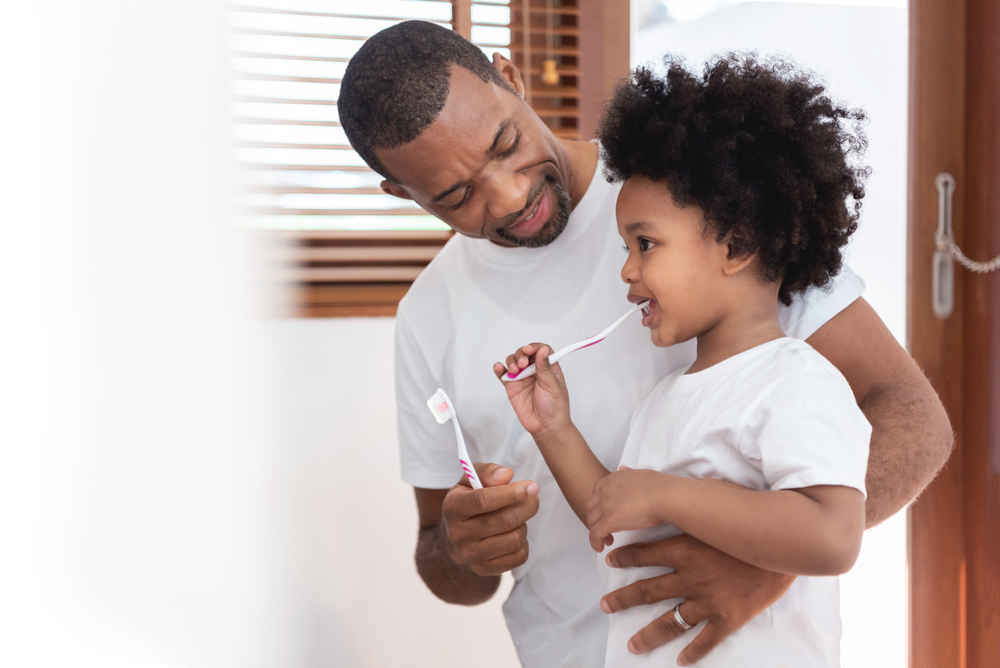What to Know About National Children’s Dental Health Month
There’s nothing like seeing your child smile. It can drive away all the negativity of your day in an instant. But there’s nothing like tooth decay and bad breath to chase that feeling away just as quickly. Children’s dental health is a serious matter, and a lack of it can result in inconvenient—or even dangerous—problems like gum disease or oral cancer. Healthy teeth are crucial for a confident smile. Convincing your children to maintain good oral hygiene consistently can be a tough habit to create, but it’s certainly possible and definitely worth it. And there’s no better time to do it than this children’s dental health month.
- A Month Dedicated to Strengthening Your Child’s Teeth
- How You Can Take Part in Preventing Oral Health Problems Among Children
- The Benefits of Maintaining Good Oral Hygiene
- Wrapping Up
A Month Dedicated to Strengthening Your Child’s Teeth
The American Dental Association observes Children’s Dental Health Month every February. It started as a one-day event in 1949 and was updated to a full month in 1981—owing to its growing importance and need.
Its purpose is to provide helpful tips to parents and encourage children to adopt healthy oral hygiene. Some of the initiatives of Children’s Dental Health Month include:
- Displaying colorful templates depicting dental issues and an easy-to-follow oral hygiene routine nationwide in the U.S.
- Businesses and educational institutions are encouraged to develop creative group and individual activities related to teeth and gums for kids to follow.
- Reminders about regular children’s dental health checkups and oral hygiene are passed through messages, ads, and announcements
How You Can Take Part in Preventing Oral Health Problems Among Children
The easiest way to find an awareness campaign near you is by asking your pediatric dentist. Every dental clinic has activities, ideas, and proven strategies to help engage your child in proper brushing, flossing, and other dental hygiene practices. You can try the ones that suit your child the most.
Share Good Oral Hygiene Practices with Your Friends
Encourage your friends to visit the dentist regularly with their children. Share your experiences and the oral health tips that you learn along the way. A lot of the time, parents just need someone to trust and who they know won’t look down on their struggles.
If your child hates dentist visits, bring their friends along. Let your children carry their favorite toys or books and listen to their concerns.
Don’t force your child to visit the dentist. It is an overwhelming experience for many of them. Tell them how to maintain healthy teeth and gums at home until they’re ready to visit a professional.
Teach Your Children About the Importance of Daily Brushing
The best habits start early. Don’t just tell your kids why they need to brush their teeth, use dental floss, and do a mouth rinse every day; teach them. Demonstrate how they can gently brush their teeth, remove plaque and food particles, and protect their baby teeth from damage. Take time out in the morning and at night to practice with them.
Children often grow up using irregular and small circular motions in the wrong direction. This habit can ruin the alignment of their teeth. Whatever brushing technique you follow, ensure your child follows it diligently and consistently. Correct your children’s mistakes and encourage them to be meticulous about their oral hygiene.
Adolescents are often aware of the importance of proper oral hygiene but still tend to be negligent. The reason behind this is a lack of habit formation and parental guidance. Giving them little reminders about good oral hygiene now and then will go a long way.
Arrange a Family Activity and Practice Proper Oral Hygiene Together
Dental care for kids begins at home. Dedicate a few minutes every day to go over the importance of proper oral hygiene with your child and make it fun! If they love competitions, challenge them. If they like to read, add small infographics in the bathroom. There are even podcasts dedicated to helping kids have fun and learn while brushing for the full 2 minutes.
Help your kids build a healthy relationship with dentists and avoid smoking around them because mark my words. They will follow everything you do. You have to be careful if you want them to be careful. Don’t neglect your oral hygiene routine, and get regular dental checkups.

Be Patient
It is crucial to understand that children are not efficient at taking care of their teeth and gums despite the efforts taken to guide them. So do not expect perfection from your little ones. Instead, focus on teaching them to master techniques and be conscious about their oral hygiene.
Praise your children at every step and give them little reminders here and there. You’ll be surprised how quickly they’ll learn.
What to do for Healthy Teeth
Nothing can replace natural teeth, so it is best to take care of them before it’s too late. Here are a few things you and your children can do to protect your tooth enamel and prevent bad breath, tooth loss, and other oral health problems.
Use a Fluoride Toothpaste and Dental Floss
Scientific evidence suggests that fluoride toothpaste is more effective at preventing tooth decay than non-fluoride options. However, you have to be careful not to overexpose your child to fluoride as it can do more harm than good. Ask your dentist for recommendations and follow their advice to avoid other oral health issues.
Keep up with the Latest Children’s Dental Health and Craniofacial Research
What research shows today might get negated tomorrow. So you should keep up with the latest trends. Get your information from qualified professionals and researchers instead of random articles on the internet. If you find something new and relevant, discuss it with your dentist.
Visit the Dentist Regularly
No one is perfect. You can miss a spot or two when you brush your teeth. The same goes for your children. Your dentist will take care of that. They will also guide you with the best practices for healthy teeth and gums.
Practice Daily Brushing and Avoid Sugary Foods
Brushing every day is a foolproof way of keeping oral bacteria and children’s dental health problems under check. It not only removes plaque but also prevents certain bacteria from ruining your breath. You can also try a tongue scraper and dental floss for a deeper cleanse.

Excessive sugar consumption is a primary source of dental caries and tooth decay. So don’t let your children eat too many sugary foods. Control the quantity and provide them with healthier alternatives.
Avoid Smoking
Set a good example for your children and avoid smoking and other tobacco products. If you want your child to have the perfect smile, take care of yourself first.
The Benefits of Maintaining Good Oral Hygiene
Keeping your gums healthy and brushing your teeth might seem overrated, but you’ll be surprised by how many benefits it has.

Disease Control and Improved Overall Health
Everything you eat and drink has to pass through your mouth. And if your mouth is home to oral bacteria, these pathogens can pass to your stomach and bloodstream and cause serious health problems.
Gum diseases and stubborn dental plaque can be tricky to get rid of without the help of a dental hygienist. You can prevent a cavity from taking a severe form by visiting your dentist regularly and practicing proper oral hygiene.
Children’s dental health problems are not the only reason you should seek dental services. Regular checkups will give you more confidence, eliminate anxiety, and have a positive impact on your overall health.
No More Bad Breath
A mouth rinse a day keeps the bad breath away. Children tend to grow increasingly insecure about their bad breath with age. They might start talking less and avoid conversations because of this insecurity. This can negatively impact their quality of life.
Prevent Oral Cancer and Bleeding Gums
Good oral health has enormous long-term benefits. It will keep your gums healthy, protect your tooth enamel, eliminate certain bacteria, and prevent other oral health issues.
Chewing tobacco or smoking and excessive alcohol consumption can increase your risk of oral cancer. Don’t expose your child to these addictions, and practice self-restraint. Remember, children copy what they see.
Good Oral Hygiene Makes it Easier to Enjoy Food
Sensitive teeth and gums can ruin a child’s appetite. Anything too hot or too cold will trigger pain. So your child needs to have robust oral health to enjoy food and eat to their fill.
Wrapping Up
When it comes to children’s dental health, you have to take proactive measures early on during childhood to avoid serious complications in the future. The American Dental Association has declared the entire month of February as Children’s Dental Health Month. Although you don’t have to wait for February, this month offers good incentives and plenty of online resources to encourage your child to practice good dental hygiene.








